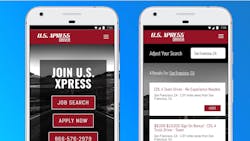Slicker mobile web experience delivers more truck driver applicants
Internet use on smartphones and other mobile devices — and your website's performance on those devices — are no longer afterthoughts.
That might be the key takeaway from U.S. Xpress' latest driver recruitment effort, where this top truckload carrier sped up its mobile web page loads and boosted the resulting job application rate by more than 60%. It also signals a practical trend in how truck drivers are likely to apply for jobs today and in the future.
"The reality is, current recruitment websites are not always mobile-friendly and often struggle with loading job applications in a timely manner," noted Eric Fuller, the company's CEO. "With more and more potential applicants using their mobile devices to apply for jobs, this is just not acceptable."
U.S. Xpress engaged the Johnson Group marketing, branding and research firm to optimize its recruitment site's mobile content using Google's Accelerated Mobile Pages (AMP) technology. AMP is an open-source framework launched in early 2016 that uses the same coding across multiple mobile platforms, so it doesn't matter what smartphone, tablet or other device the content is loaded on.
As a result, the mobile content loads about five times faster: median load time for a non-AMP page is 22 seconds, compared with just 0.7 seconds for AMP-coded page. Industry research has shown that, essentially, the slower a web page loads, the higher the reader bounce rate climbs, U.S. Xpress and the Johnson Group pointed out.
Trending
Some of the carrier's old mobile pages for job applications took more than a minute to load, likely frustrating users and driving then away. Testing out the AMP technology, U.S. Xpress found the optimized version of its recruitment landing page converted 3.412% of visitors to completed job applications vs. a 2.118% conversion rate for the non-AMP page.
Like many seemingly incremental gains in trucking, the improvement could mean significant bottom-line benefits. That 62% bump up in job applications could save up to $1 million in annual recruitment costs, the carrier projected.
Further, the quicker AMP framework could be particularly relevant for truck drivers and how they've come to use the Internet. "Due to the nature of their jobs, truckers are in constant motion, and the vast majority of potential hires access U.S. Xpress' landing pages on their phones," according to a case study of the carrier's 20-day trial using AMP technology with one of its main recruiting sites.
To maximize cost savings, U.S. Xpress now plans to implement the faster mobile web content for all its recruiting platforms. "Our industry has to find ways to improve our ability to recruit and hire drivers so we can meet the increased shipping demands of our customers," Fuller contended.
About the Author
Aaron Marsh
Aaron Marsh is a former senior editor of FleetOwner, who wrote for the publication from 2015 to 2019.


